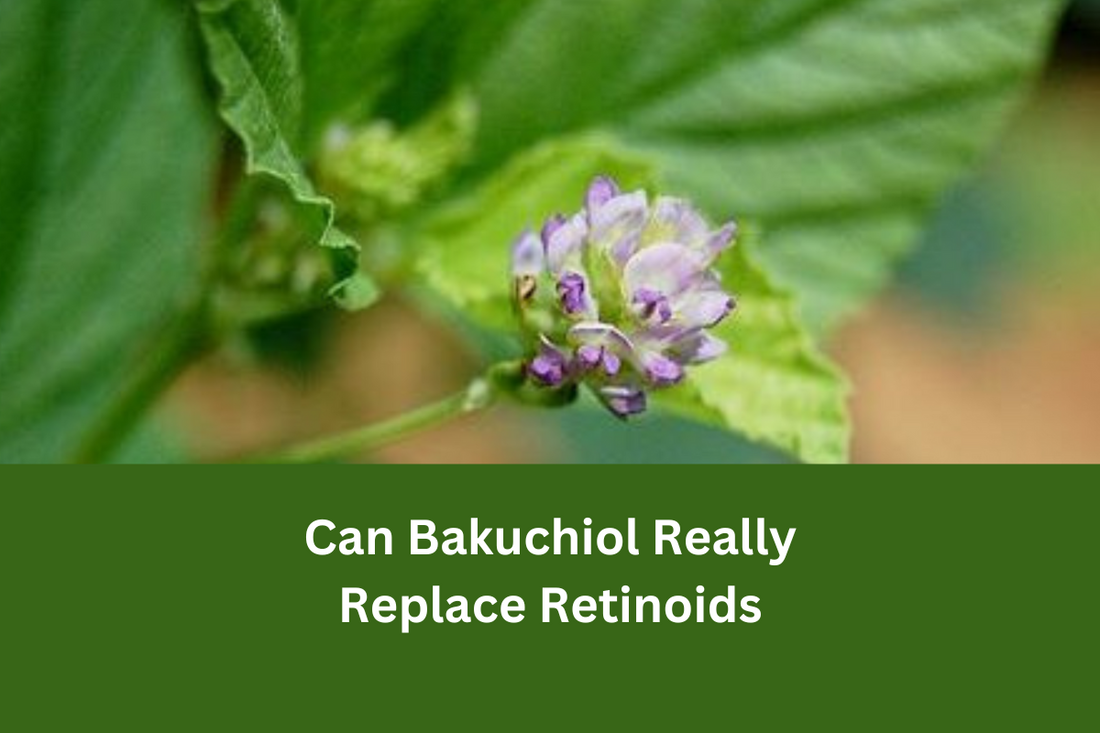
Can Bakuchiol Really Replace Retinol?
Share
The short answer is "yes." I believe it is better and more exciting
Bakuchiol has been so popular for the past few years for a good reason, which is exciting news for me. But can it really replace retinol, the queen of antiaging? Why does retinol need to be replaced?
The Weakness of Retinol
Two major weaknesses of these ingredients stop some of the formulators and end users from using these ingredients.
Stability Issue
Retinol has dominated antiaging skincare for many, many years. However, its susceptibility to degradation is a limiting factor in its widespread use. Because of this weakness, we don't know if it really works in a formula. It might have worked right after it was made. Will it work after it is stored, distributed, and finally retailed to the end users?
Retinol deteriorates fast when exposed to air(oxygen), light, heat, and acids. It is hard to maintain its stability in water-containing skincare products. According to one study, retinol can be stable for only up to 24 hours if it is kept in a dark, oxygen-absent container. In another study, retinol levels in an anti-aging face serum decreased by 25–79% over 30 days, with the largest decrease in samples exposed to light and stored in transparent containers. Even with the best packaging method, Retinol efficacy decreases by 21% within 30 days. Well, that is not good enough for us because the distribution process takes several months before reaching the end user, and the storage conditions also play a role in its stability issue.
Although formulation methods and packaging are important, Long-term and accelerated stability testing revealed retinoid instabilities in almost all products, resulting in a 0%-80% decline after 6 months at 25°C and a 40%-100% decline at 40°C.
Retinol continuously deteriorates on our skin. Another study shows that even if formulated with antioxidants and sunscreens, it can only stay stable for four hours when exposed to UV light, oxygen, and body temperature.
What about the expiration date?
Most retinol skincare products have a two-year shelf life. We all need to know the expiration date has nothing to do with efficacy. It only means the product can be used safely even if the efficacy is completely diminished. In other words, no skincare products guarantee you the efficacy.
Vitamin A Dermatitis - Causes skin aging
The second huge weakness of retinol is its skin irritation. It is bad enough and appears often enough that medical professionals even name it - vitamin A dermatitis. It causes skin redness, dryness, burning sensation, and even a rash. All these symptoms tell us that retinol causes skin inflammation. Inflammation causes skin aging. Some inflammation is obvious; others are not so visible. It looks like we have to age our skin first before we can benefit from retinol. Unfortunately, once the damages are done, reversing is so difficult. This side effect really makes me think if it is worth using. I always believe prevention is more important and easier than trying to reverse the damages after it happened.
You might say that this kind of product really works for you. For most of us, we need to find something that works for sure. The good news is that we no longer have to stick with retinol. Now we have bakuchiol.
Bakuchiol
Bakuchiol is a phenolic monoterpene and meroterpene phenol extract from plant (Babchi) seeds. It has been used as a traditional medicine for centuries in China.
According to clinical studies, Bakuchiol at 1% has been shown to promote the full spectrum of antiaging benefits and even a tad better in research when compared with retinol. This is not surprising. Studies show that bakuchiol works through similar pathways as retinol. It also provides both anti-aging and anti-acne skincare benefits.
In clinical studies, bakuchiol can visibly reduce the roughness of the skin and wrinkles, promote collagen synthesis, and enhance the skin's overall health. Its antioxidative property is 8.5 times stronger than vitamin E in protecting the skin against oxidative stress in the full ROS spectrum.
In anti-acne studies, bakuchiol shows its anti-microbial, anti-inflammatory, and down-regulating sebum product properties. It helps reduce the formation of new comedones by preventing the oxidation of lipids in sebum and hyperkeratinization. It shows a better outcome when used with 1-2% salicylic acid cream than using either alone.
Its ability to address multiple signs of skin aging gains the name of plant retinol.
Bakuchiol wins the competition by working like retinol without skin irritation, providing stronger photoaging protection, and no photosensitive side effects. You can safely use it at any time during the day.
The funny thing is that forming bakuchiol with retinol can extend its efficacy by 2 folds. If you are a true retinol fan, choosing a more stable form (Retinyl acetate), avoiding light and water, and using bakuchiol as a stabilizer can make a huge difference. For me, achieving the same goal with fewer ingredients is a win, especially for sensitive skin types.
If you would like to see an example of an easy way to use this awesome ingredient effectively, click HRER
Thank you for reading. Happy Skincare!
Lian

